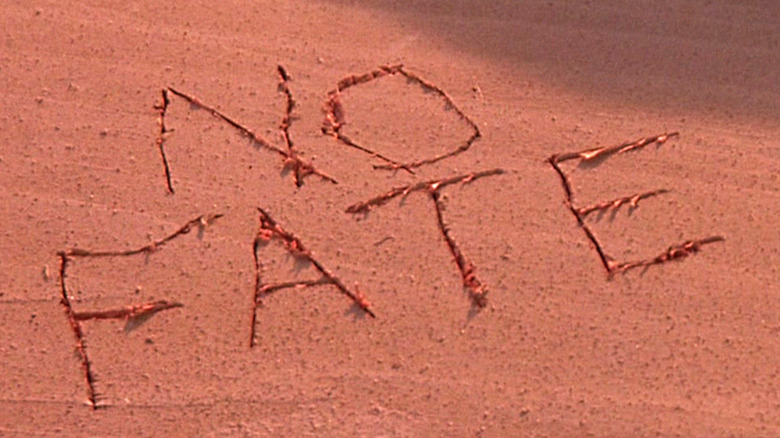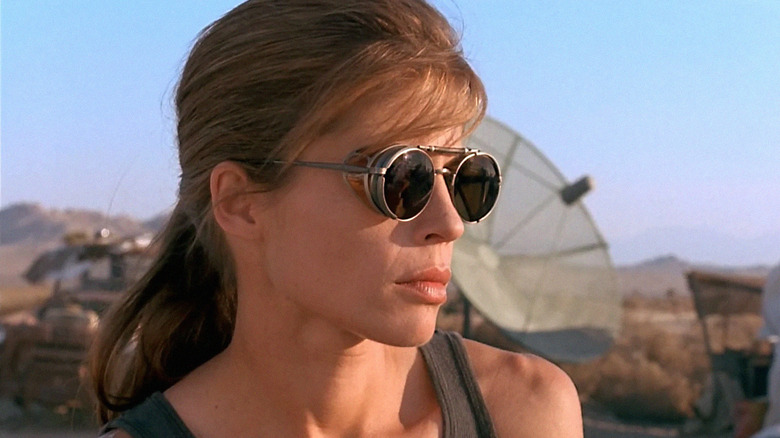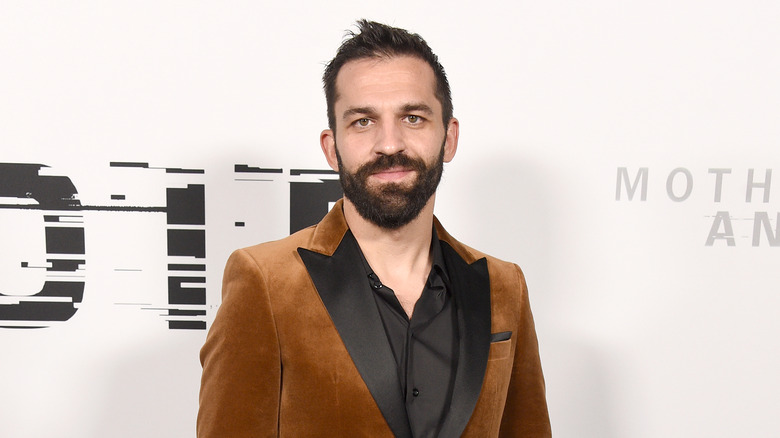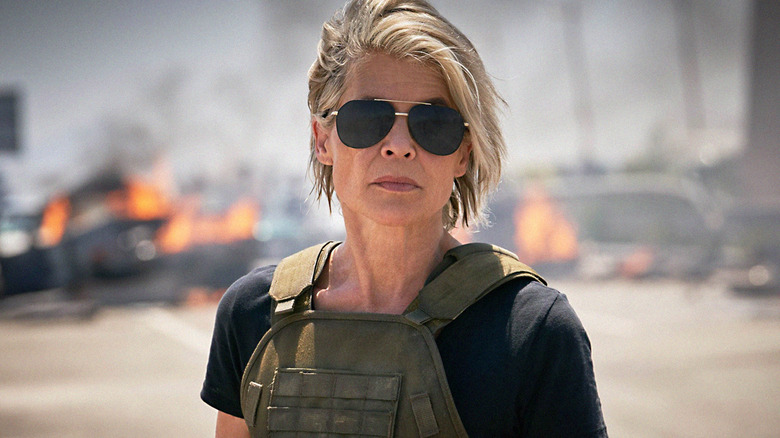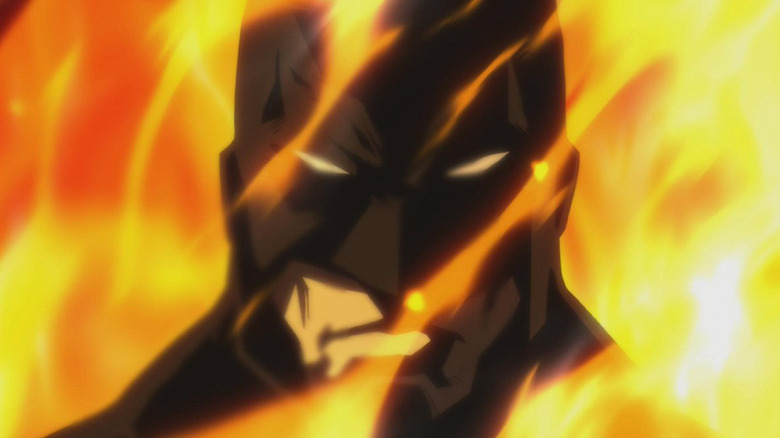The Terminator Anime: 5 Huge Teases Netflix Revealed In Its Tiny Trailer
Netflix is currently in the process of developing an anime series based on the Terminator film franchise. The streaming service gave fans some insight into this project for the first time since its announcement in 2021 with a short teaser on November 11, but it's particularly light on details. Rather than showcasing what classic Terminator characters might look like in animation for what is more-or-less the first time, the brief preview consists predominately of Japanese-language text that morphs into English translations in the classic Terminator logo font.
The idea of an animated Terminator isn't necessarily new — in 2008 an anthology series titled "Termination" was in development, but given a lack of movement in the years since, it seems to have never quite made it past the planning stage. The sole official animated Terminator project, meanwhile, is "Terminator Salvation: The Machinima Series," which serves as a brief, computer-animated prequel to the 2009 "Terminator Salvation" film.
Given the small scale of the machinima "Salvation" series, Netflix's anime will be the first major animated Terminator series. Fans looking forward to this new development in the classic franchise, then, can rest assured that in spite of its brevity, the streaming service's debut trailer nevertheless teases five significant developments about "Terminator: The Anime Series."
'There is no fate' is an important concept in every Terminator film
The very first image onscreen in the first "Terminator: The Anime Series" trailer is text reading, "運命なんてものはない." This morphs into an English translation reading, "There is no fate."
Rather than referencing one particular moment or scene from the Terminator franchise, this is a quote important to each entry in the film series. Its debut is in the very first "Terminator," which stars Michael Biehn as Kyle Reese, a man who travels back in time from 2029 to 1984. He's trying to stop The Terminator (Arnold Schwarzenegger), who also traveled back in time, from assassinating Sarah Connor (Linda Hamilton), the mother of a revolutionary named John Connor in their future timeline. After divulging this info, Reese shares that "there is no fate" is a notion that John wanted to communicate to the version of his mom in his past.
"No fate" resurfaces in some permutation or another in every subsequent Terminator movie. Thematically, it refers to the idea that, while a robot apocalypse has rendered the future from which Reese and the Terminator have traveled into a dystopia for humans, Sarah isn't bound by that fate and is free to make her own future. While this is broadly important, the next piece of plot info in the first "Terminator" anime trailer helps contextualize how this concept will apply to the anime, in particular.
August 30,1997 is close to a significant date in the Terminator franchise
After "there is no fate" appears onscreen, the "Terminator: The Anime Series" teaser details some of the behind-the-scenes staff involved in the show's production. Then, the new text reads — again, first in Japanese and then in English — "On August 30th, 1997... two days from now... everything changes."
While neither August 30 nor September 1 holds any existing relevance to the Terminator franchise, both of these dates are very close to August 29, 1997, which is key to the plot of "Terminator 2: Judgment Day." This date and the film's subtitle refer to the moment the neural network Skynet gains sentience and triggers a nuclear attack that escalates into a worldwide dystopia. This catastrophe has already happened in the future timeline and is scheduled to happen on that date in Sarah Connor's present.
August 30, 1997, then, tells fans two important things about "Terminator: The Anime Series." First, it's likely that the plot of the anime series will likewise revolve around an effort to stop Judgement Day. Since "Terminator 2" is widely considered the most classic entry in the film series, this is perhaps unsurprising. What is maybe surprising is that this brand new date effectively confirms that the "Terminator" anime is a reboot that doesn't take place in the ongoing movie timeline — barring any multiverse or time travel shenanigans, which could also be the source of the date's slight alteration.
Showrunner Mattson Tomlin is also working on the current Batman film series
During the portion of the "Terminator: The Anime Series" trailer that details the series' staff, the only name that's not a production company is Mattson Tomlin, who will serve as writer, executive producer, and showrunner.
Tomlin's first credit on a major Hollywood production was as the sole writer of Netflix's original sci-fi film "Project Power" in 2020. He also wrote and directed "Mother/Android" for Hulu the following year. Then he got his start working on a major franchise film when he helped finish the screenplay for "The Batman," though his contributions didn't quite constitute a screenwriting credit. His work did, however, seem to impress director Matt Reeves, who hired Tomlin to officially co-write the screenplay for "The Batman Part II."
Meanwhile, his relationship with Netflix that kicked off with "Project Power" resulted in more than just the "Terminator" anime. He's also credited as a co-writer on scripts for film adaptations of the "Mega Man" video games and Keanu Reeves' comic book, "BRZRKR."
For"Terminator: The Animated Series," Tomlin should bring a level of skill and professionalism that landed him work on multiple major franchise films in a span of just a few years.
Animation is new territory for Skydance, but it has a solid track record with sci-fi
One of Netflix's key collaborators in the making of "Terminator: The Anime Series," listed in its first trailer's opening credits, is Skydance Media. The company's involvement is unsurprising given that, per a deal with the original two films' director James Cameron, it controls the rights to The Terminator. That said — and in spite of a subpar critical reception to their first outing, "Terminator Genisys" — there's reason to be optimistic about Skydance's involvement.
First and foremost, critics were comparatively far kinder to the second Skydance Terminator movie, "Terminator: Dark Fate." Plus, beyond the Terminator franchise, Skydance recently started up an animation studio with former Pixar executive John Lasseter called Skydance Animation, debuting its first film in 2022. That said, it's not Skydance Animation that's credited with "Terminator: The Anime Series," but simply Skydance Media. The company's new animation wing nevertheless suggests an increased emphasis on animation in its future.
Also encouraging is the fact that sci-fi is well within the company's wheelhouse. Acclaimed Skydance sci-fi movies and TV shows include "Star Trek Into Darkness," "Annihilation," "Altered Carbon," and "Foundation." Meanwhile, handling animation duties and being responsible for the fact that this animated Terminator show can be considered anime is another studio with a noteworthy track record.
Production I.G. worked on Halo and Batman anime series before Terminator
The anime studio responsible for "Terminator: The Anime Series" and the final big name listed in the credits of the show's first trailer is Production I.G. Habitual anime viewers are likely already familiar with this name as the studio behind several major shows, including "Ghost in the Shell: Stand Alone Complex," "Kuroko's Basketball," "Psycho-Pass," and "Haikyu!!" That said, working on a Western property is far from new territory for the studio, which has produced both original Western anime and adaptations of major properties in the past.
In 2008, notably, Production I.G. worked on two episodes of a six-episode "Batman" anime anthology called "Batman: Gotham Knight." Two years later the studio similarly worked on two shorts in a "Halo" anime anthology titled "Halo Legends."
Original projects produced in collaboration with Western studios, meanwhile, include Netflix's "Neo Yokio" and Adult Swim's "Fena: Pirate Princess." Not only is Production I.G. a big name in anime, but there are few other anime studios better qualified to work on adapting a major American film property into an original anime series.
